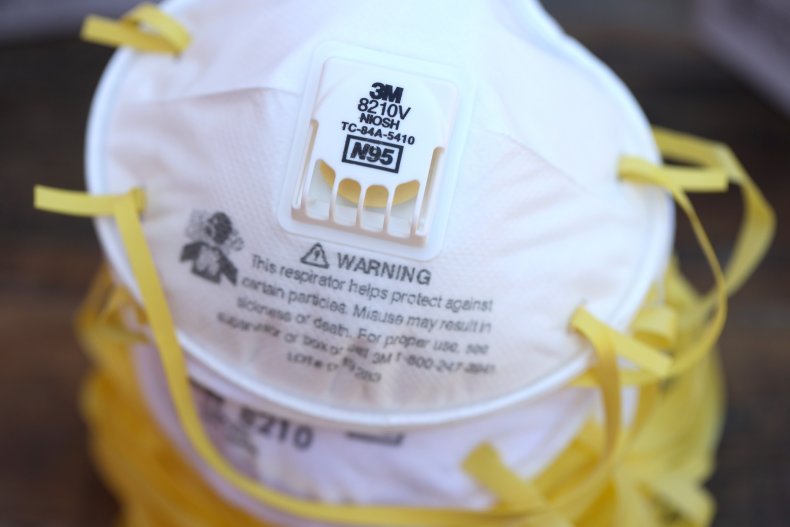U.S.' Largest Manufacturer of N95 Masks Says Company Has Millions of Unsold Units
Prestige Ameritech, the country's largest N95 mask manufacturer based in Fort Worth, Texas, has millions of unsold masks, according to CEO Mike Bowen, the Associated Press reported.
Bowen said that his company is not alone as other U.S. manufacturers have stockpiles of unsold N95 masks due to an increase in investments into the medical device during the pandemic.
"While nurses pleaded for clean masks, American N95 makers were filling their warehouses with N95s that hospitals weren't buying," Bowen said, according to AP. "Starting today, America's healthcare workers can and should demand clean, new N95 masks. The N95 mask shortage is over."
The heightened supply of N95 masks comes as President Joe Biden's administration moved to end the exception policy that allowed hospital workers to reuse and ration the masks that were previously meant for single use.
"The U.S. Food and Drug Administration (FDA) is recommending health care personnel and facilities transition away from crisis capacity conservation strategies, such as decontaminating or bioburden reducing disposable respirators for reuse," the FDA said in an April 9 statement.
The FDA said its recommendation comes from the increased supply of new respirators approved by the Centers for Disease Control and Prevention (CDC). However, N95 masks are still allowed to be reused and sterilized until there is an official order that declares otherwise, the FDA said.
For more reporting from the Associated Press, see below.

Thousands of medical providers have died in the COVID-19 pandemic, many exposed and infected while caring for patients without adequate protection.
Critical shortages of masks, gowns, swabs, and other medical supplies prompted the Trump administration to issue guidelines for providers to ration, clean, and reuse disposable equipment. Thus, throughout the pandemic, once a week many doctors and nurses were issued an N95 mask, which is normally designed to be tossed after each patient.
Now U.S. manufacturers say they have vast surpluses for sale, and hospitals say they have three to 12 month stockpiles.
In the coming weeks or months, the FDA will issue updated guidance and, eventually, require hospitals to revert to single-use, said Suzanne Schwartz, director of the FDA's office of strategic partnerships and technology innovation.
"The ability to decontaminate was purely a last resort, an extreme measure," Schwartz said. "From the FDA's perspective, there is a need for us to move back towards contingency and conventional strategies, which is, you use the respirator for the interaction, and then you dispose of it and get a new one. We are in unison, in sync, with both NIOSH and OSHA in that position."
The National Nurses Union, the largest professional association of registered nurses in the country, calls the new guidance "a tiny step in the right direction." But the organization, representing 170,000 nurses, said the direction "ultimately fails" to protect nurses because it allows employers to use their discretion about what normal N95 supply is.
"But we know the reality— there is ample N95 supply," said the union in a statement urging the administration to update their standards and enforce them.
ICU nurse Mike Hill, who works at a Northern California Sutter Hospital and is a member of the California Nurses Association, said he and his colleagues still don't have unlimited access to N95 masks.
"I think it's ridiculous for Sutter to want to do extended use when the masks are inexpensive, like a dollar apiece. They should want to make sure to protect the nurses, we're the frontline workers," he said. "It puts the patients and us at risk for infection. They were never intended for extended use."
Hill's colleague, Sutter nurse Janine Paiste-Ponder, 59, was among hundreds of medical caregivers who died after exposure to COVID-19 at the workplace in the past year. Following her July 2020 death, a California's Division of Occupational Safety and Health investigation at Sutter Health's Alta Bates Summit Medical Center led to $155,250 in fines for numerous COVID-related workplace safety violations.
Congresswoman Anna Eshoo said the deadly shortages were "a national embarrassment and should never happen again."
"This is welcome news and demonstrates our progress toward crushing COVID-19," said the California democrat. "We must make sure this type of shortage never happens again by reinvesting in a sustainable supply of high-quality, American-made PPE."
Newsweek, in partnership with NewsGuard, is dedicated to providing accurate and verifiable vaccine and health information. With NewsGuard's HealthGuard browser extension, users can verify if a website is a trustworthy source of health information. Visit the Newsweek VaxFacts website to learn more and to download the HealthGuard browser extension.

